Discover the revered symbolism of gray hair in the KJV Bible, highlighting a journey of wisdom and respect that transcends time.
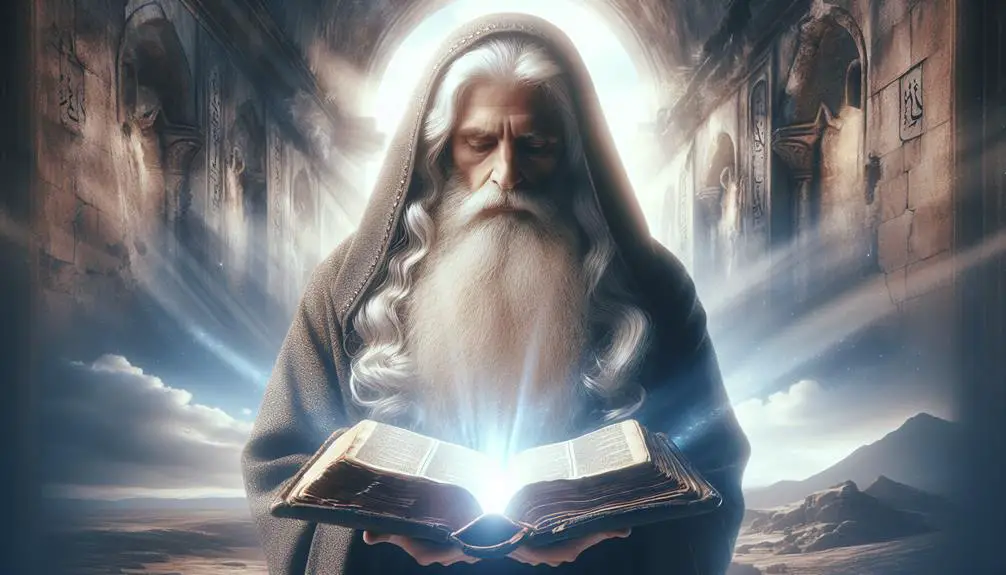
Gray Hair in the Bible Kjv
You might think that the topic of gray hair in the KJV Bible is too specific or mundane to offer much insight, but you'd be surprised at the depth of symbolism and wisdom it carries.
Gray hair isn't just mentioned as a sign of aging; it's revered as a crown of glory, representing a life rich in experience and wisdom. The Proverbs and references to elders underline the respect and authority bestowed upon those who've journeyed longer in life.
As we explore these passages, you'll uncover a fascinating intersection between cultural perspectives and biblical teachings, offering a fresh lens through which to view age and honor.
Key Takeaways
- Gray hair symbolizes wisdom and respect, reflecting a life rich in experiences according to the Bible.
- Proverbs associates aging with gaining invaluable wisdom and respect, emphasizing the importance of elders in society.
- In biblical tradition, gray hair is considered a crown of glory, signifying a reward for a righteous life.
- Cultural reverence for gray hair across various traditions underscores its significance as a marker of wisdom and societal contribution.
Symbolism of Gray Hair
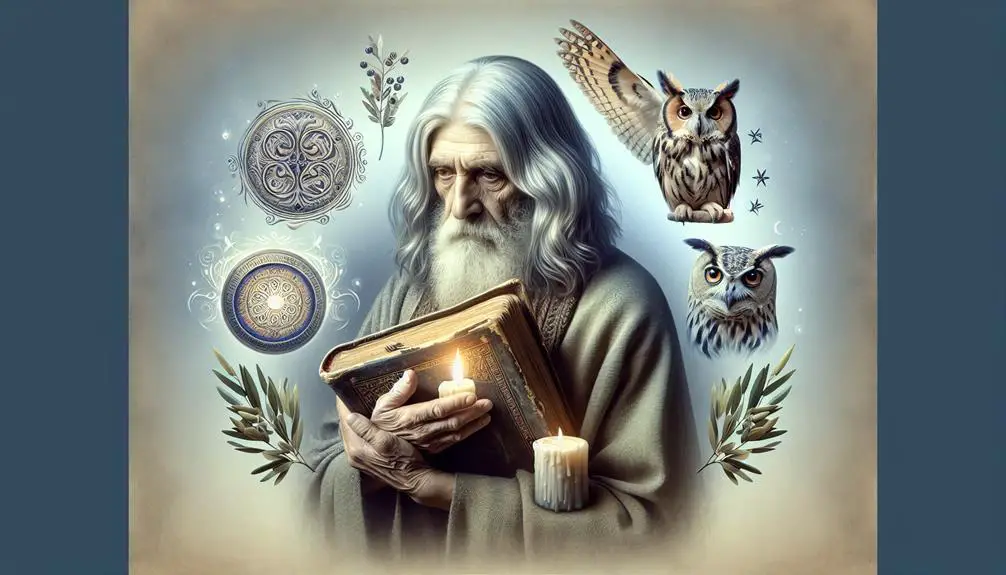
In the biblical context, gray hair symbolizes wisdom, respect, and the accumulation of life's experiences, offering a tangible sign of the reverence due to elders. This imagery isn't merely illustrative; it's deeply rooted in a cultural understanding that aging wisdom is a valuable asset to both family and community. As you delve deeper into the scriptures, you'll find that this isn't an isolated theme but a recurrent message emphasizing the importance of honoring those who've traversed life's journey longer than we have.
You may notice that the Bible doesn't just speak to those of advanced years but also addresses youth respect. It's a two-way street; as much as the young are instructed to listen and learn from their elders, the aged are reminded of their responsibility to guide and teach. This mutual respect forms the backbone of a society that values wisdom over mere knowledge, understanding that the gray hair of an elder symbolizes not just years passed but lessons learned, shared, and treasured.
Analyzing these biblical references, you're invited to reflect on how modern society aligns or diverges from these ancient teachings. Do we still hold aging wisdom in high esteem? Does youth respect for elders manifest in the same way? The biblical narrative challenges you to consider these questions, underscoring the timeless value of gray hair as more than a sign of aging—it's a badge of honor.
Proverbs on Aging
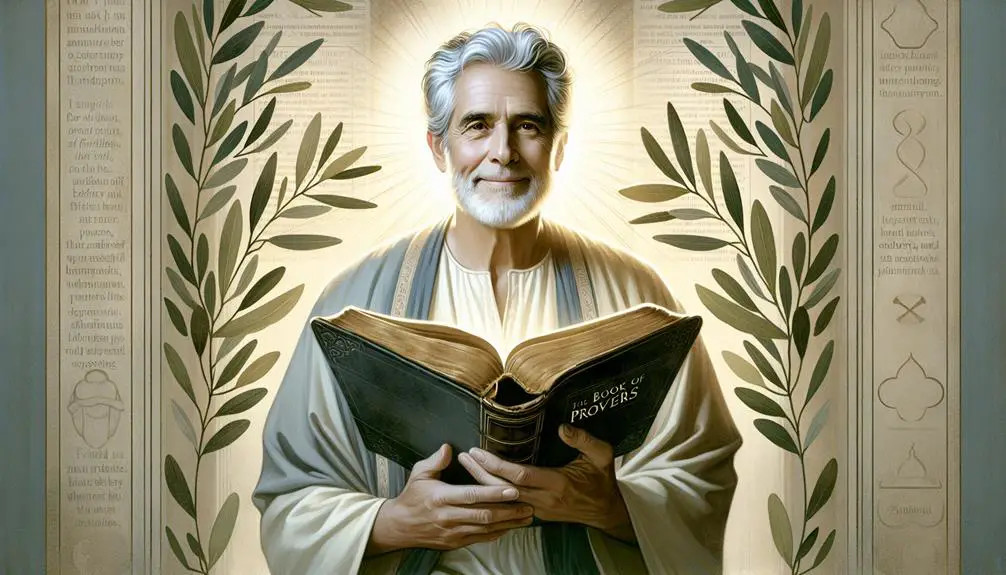
The book of Proverbs offers timeless wisdom on aging, emphasizing its value and the respect it commands within a community. You'll find that age wisdom and life experience are highlighted as invaluable assets, reflective of a life well-lived and lessons learned. Proverbs treats aging not as a decline but as an ascent to greater understanding and insight. This perspective is crucial in a society that often prioritizes youth over the insights garnered through years of experience.
Delving deeper, you'll notice that Proverbs doesn't merely suggest respect for the aged; it positions them as repositories of wisdom and guidance. The text suggests that with age comes the responsibility to impart knowledge, underscoring the relational aspect of wisdom—it's not just to be accumulated but shared. This sharing enriches not only the individual but the community at large.
In essence, Proverbs elevates the process of aging as a journey toward spiritual and intellectual richness. It acknowledges the challenges that come with age but frames them within the context of growth and contribution. Age wisdom, according to Proverbs, is a testament to a life's journey marked by learning, adapting, and influencing others positively.
Elders as Leaders
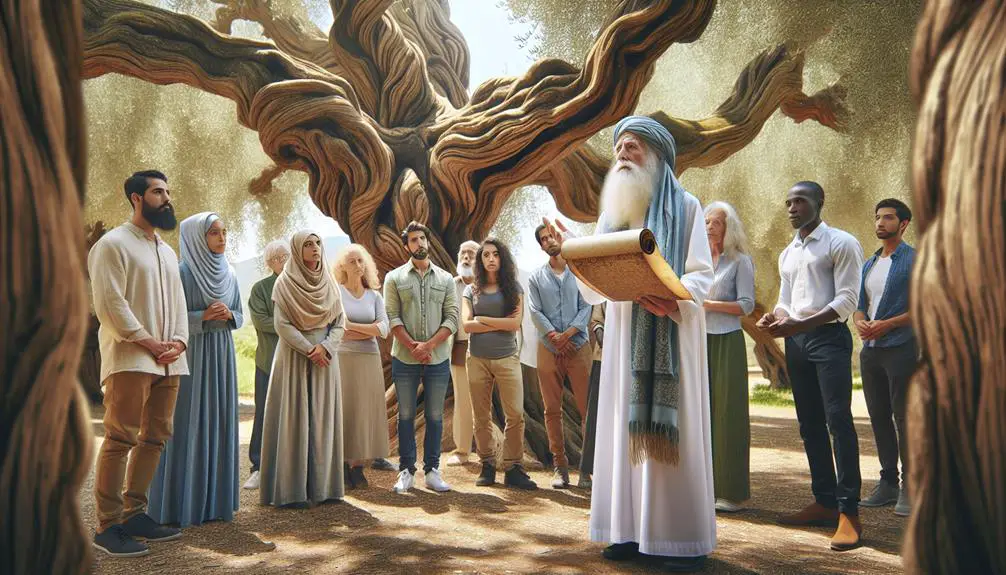
Building upon the foundation of wisdom and respect highlighted in Proverbs, elders naturally emerge as pivotal leaders within their communities. This leadership isn't merely a function of age but a testament to a life lived in adherence to divine principles. The role of elders as leaders isn't just a ceremonial title; it's a critical component in the fabric of societal structure, especially within the context of biblical teachings.
Here are three profound ways through which elders lead:
- Wisdom Transfer: Elders are vessels of wisdom, accumulated through years of experience and reflection. They guide the younger generation, not just through advice but through living examples of faith, resilience, and integrity.
- Respect Traditions: In a world rapidly changing, elders provide a link to the past, ensuring that traditions aren't lost but respected and adapted where necessary. Their leadership ensures that the community remains grounded in its identity while navigating modern challenges.
- Conflict Resolution: With wisdom comes the ability to mediate disputes with a level of empathy and understanding that's unparalleled. Elders often stand as impartial arbitrators, respected by all parties, making them indispensable in maintaining harmony within the community.
Elders, therefore, aren't just leaders; they're the embodiment of the community's collective conscience, ensuring the wisdom transfer and respect for traditions continue to flourish.
A Crown of Glory
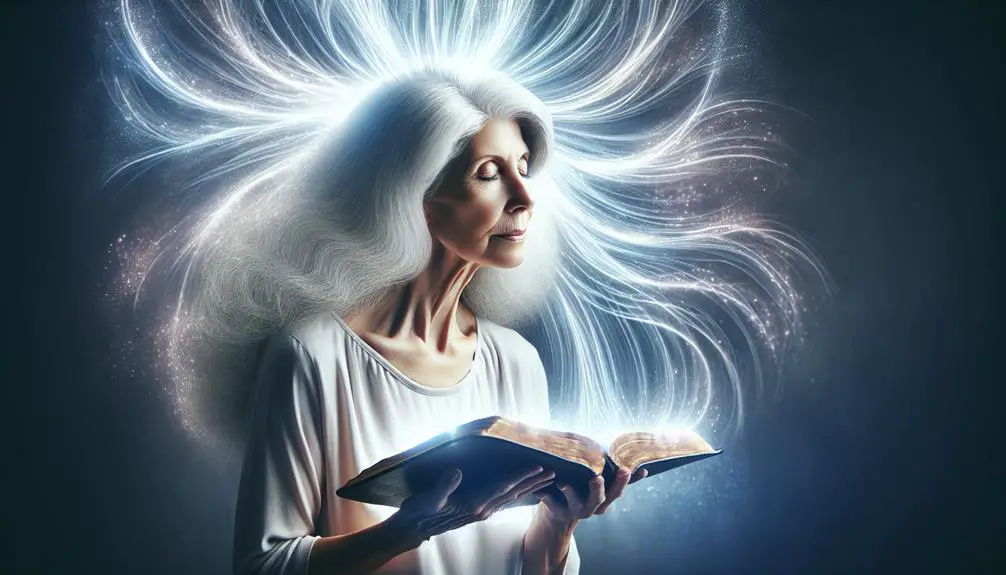
Why do we regard gray hair as a crown of glory, deeply rooted in biblical lore and tradition? This perception isn't merely a cultural phenomenon but is anchored in the wisdom and teachings found in the Bible. Aging gracefully, as depicted in the scriptures, is a sign of wisdom, a reward for a life well-lived, and a symbol of societal respect. It's not just the passage of time that grays the hair but the experiences, trials, and triumphs that come with it.
Aspect |
Biblical Basis |
Societal Implication |
|---|---|---|
Wisdom |
Proverbs 16:31 |
Valued for counsel |
Honor |
Leviticus 19:32 |
Commands respect |
Longevity |
Psalm 92:14 |
Celebrated achievement |
In this light, gray hair transcends its biological roots to embody a deeper spiritual and social significance. It's a visual testament to one's journey through life, encapsulating the battles fought, the wisdom gained, and the respect earned from those who witness this transformation. Thus, when we talk about gray hair as a crown of glory, we're not just acknowledging the aging process. We're honoring the life, the lessons, and the legacy that come with it, elevating it to a status of reverence and admiration in both biblical and contemporary contexts.
Cultural Perspectives
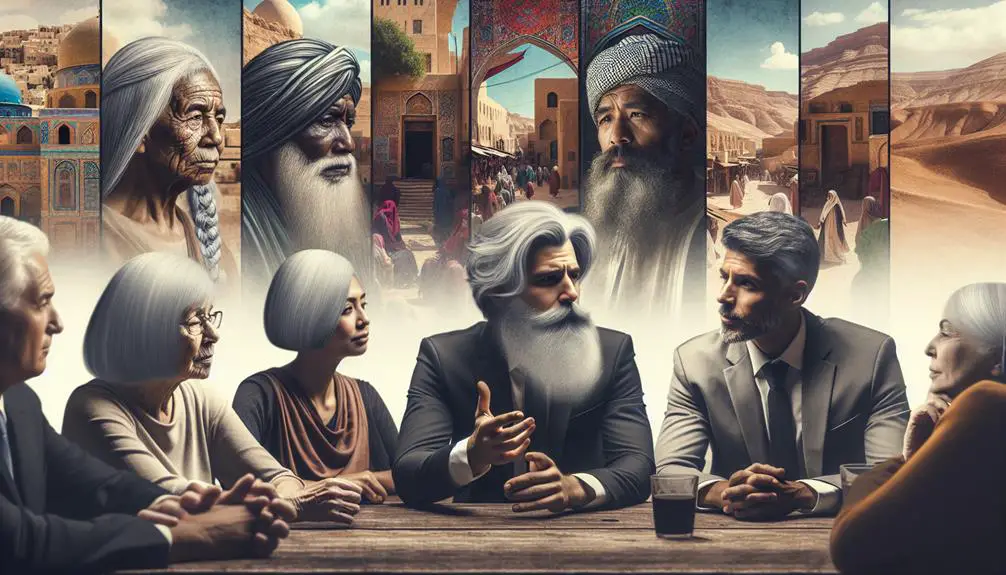
Exploring how various cultures interpret and value gray hair reveals a rich tapestry of beliefs and practices that, while differing in expression, resonate with the biblical reverence for this natural sign of aging. Across the globe, aging perceptions and the consequent acknowledgment of gray hair diverge yet often align with a foundational generational respect.
To elucidate, consider the following:
- In many Eastern cultures, gray hair isn't just a sign of aging but a symbol of wisdom and respect. Elders are revered, and their advice sought, embodying the biblical notion of gray hair as a crown of glory earned through a life of righteousness.
- Western societies have exhibited a more ambivalent relationship with aging. However, there's a growing movement that embraces natural aging processes, including the acceptance of gray hair, as markers of individuality and experience rather than decline. This shift mirrors a broader societal reevaluation of aging perceptions and generational respect.
- Indigenous cultures often hold deep respect for elders, with gray hair signifying a lifetime of accumulated knowledge and connection to ancestral traditions. This reverence aligns closely with biblical teachings on honoring those who've lived longer, seen more, and can guide the younger generations.
In these variances, the reverence for gray hair as an emblem of wisdom and respect unites cultures, reflecting a universal appreciation for the journey of life.
Frequently Asked Questions
How Do Biblical Perspectives on Gray Hair Compare to Modern Scientific Understandings of Why Hair Turns Gray?
You're exploring how ancient wisdom views gray hair versus today's scientific reasons.
While biblical texts might reverence aging and gray hair as a sign of wisdom and respect, modern science digs into the biological causes.
It reveals how genetics primarily dictate when you'll see those silver strands, and how stress can accelerate the process.
It's a fascinating blend of reverence and biology, merging past insights with contemporary understanding.
Are There Any Biblical Figures Who Were Specifically Noted for Their Gray Hair, Outside of the Context of Wisdom or Age?
You're diving into whether any biblical characters were known for their gray hair beyond age symbolism or wisdom.
To answer, the Bible doesn't highlight gray hair in character descriptions for reasons outside wisdom or age. Instead, gray hair often symbolizes experience and respect in biblical narratives.
This lack of focus on gray hair for aesthetic or non-symbolic reasons contrasts with modern attention to hair's appearance, showcasing a shift in societal values and perceptions over time.
How Do Non-Christian Religions and Ancient Cultures Interpret the Significance of Gray Hair in Contrast to the Biblical Views?
In exploring how non-Christian religions and ancient cultures view gray hair, you'll notice a rich tapestry of cultural symbolism. Unlike the biblical perspective, some traditions revere gray hair as a sign of spiritual wisdom, beyond mere aging acceptance.
These cultures often celebrate the transition, seeing it as a mark of life's experience and knowledge gained. This reverence underscores a profound respect for the aging process, highlighting a universal acknowledgment of life's journey.
What Practical Advice Does the Bible Offer for the Care or Treatment of Gray Hair, if Any?
Ironically, you won't find a holy shampoo recipe in the Bible for gray hair. Instead, it emphasizes wisdom and reverence with aging.
However, drawing from its teachings, one can infer the importance of a balanced life. Dietary influences and stress management are key; think Daniel's preference for vegetables over royal delicacies and numerous encouragements to trust in God, reducing stress.
Analyzing these, it's clear: a healthy body and spirit indirectly promote better hair health.
Does the Bible Mention Any Consequences or Judgments Related to Altering the Natural Color of One's Hair, Including Making Gray Hair Appear Younger?
You're delving into whether the Bible directly addresses the ethics of hair dye, especially in transforming gray hair to seem younger, in light of cultural beauty standards.
The Scriptures don't explicitly comment on altering hair color, suggesting no direct judgment or consequences for such practices. This implies that interpretations on the matter lean more towards personal conviction and cultural context rather than a clear, divinely ordained stance on the ethics of changing one's hair color.
Conclusion
In conclusion, the biblical perspective on gray hair, particularly within the King James Version, offers a profound respect for aging, viewing it as a symbol of wisdom and a crown of glory.
Interestingly, about 74% of people aged 45-65 view aging as an opportunity for growth and deepening wisdom, mirroring the reverence found in Proverbs.
This alignment between ancient texts and modern perceptions highlights the enduring value and honor bestowed upon the aging process, encouraging a societal embrace of this natural progression.


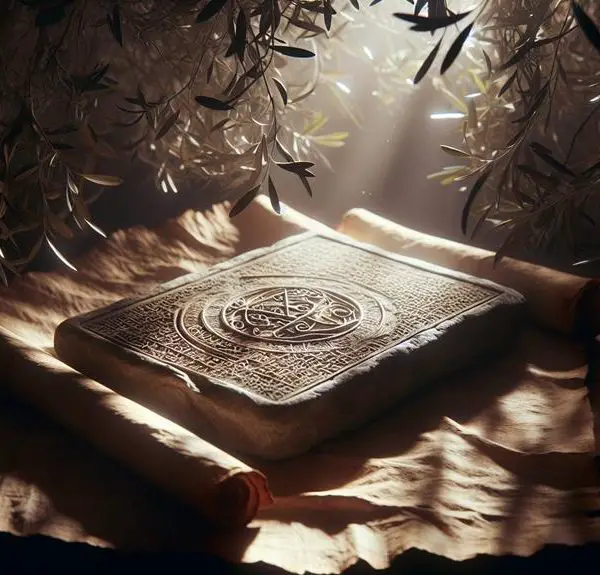
Sign up